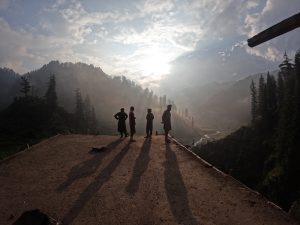DAREN VALLEY, GHAZIABAD, KUNAR — In various remote corners of Afghanistan, Taliban rule has been a fact for years. However, even in such areas the Taliban takeover of the whole country last August has had an impact. Some things became easier or even possible for the first time, while some problems — old and new — persist.
During the past 20 years, neither units of the U.S.-led military coalition nor forces or officials of the erstwhile Afghan Republic ventured much, if at all into the Daren Valley. Framed by steep escarpments that are overgrown with small trees and bushes in its lower parts and endless forests at its end, the side valley sneaking into the mighty Hindu Kush from the Kunar River in the eastern Afghan province with the same name is under the best of circumstances difficult to access. And with a population that has always been hostile to any influence from outside their valley and soon mostly sided with the Taliban, it became next to impossible to approach.
Life in these mountainous parts of Kunar and the neighboring province of Nuristan has always been hard. The narrow valleys barely provide any flat ground, so locals, most of them ethnic Nuristanis, have to precariously perch their houses with wooden beams and stones on mountain sides. This is also done to leave the little arable land on the valley floor open for farming, mainly of corn and wheat. As these natural fields would not be enough, others were wrested from the slopes by arduously building terraces up the mountain side, sometimes barely more than a meter wide.
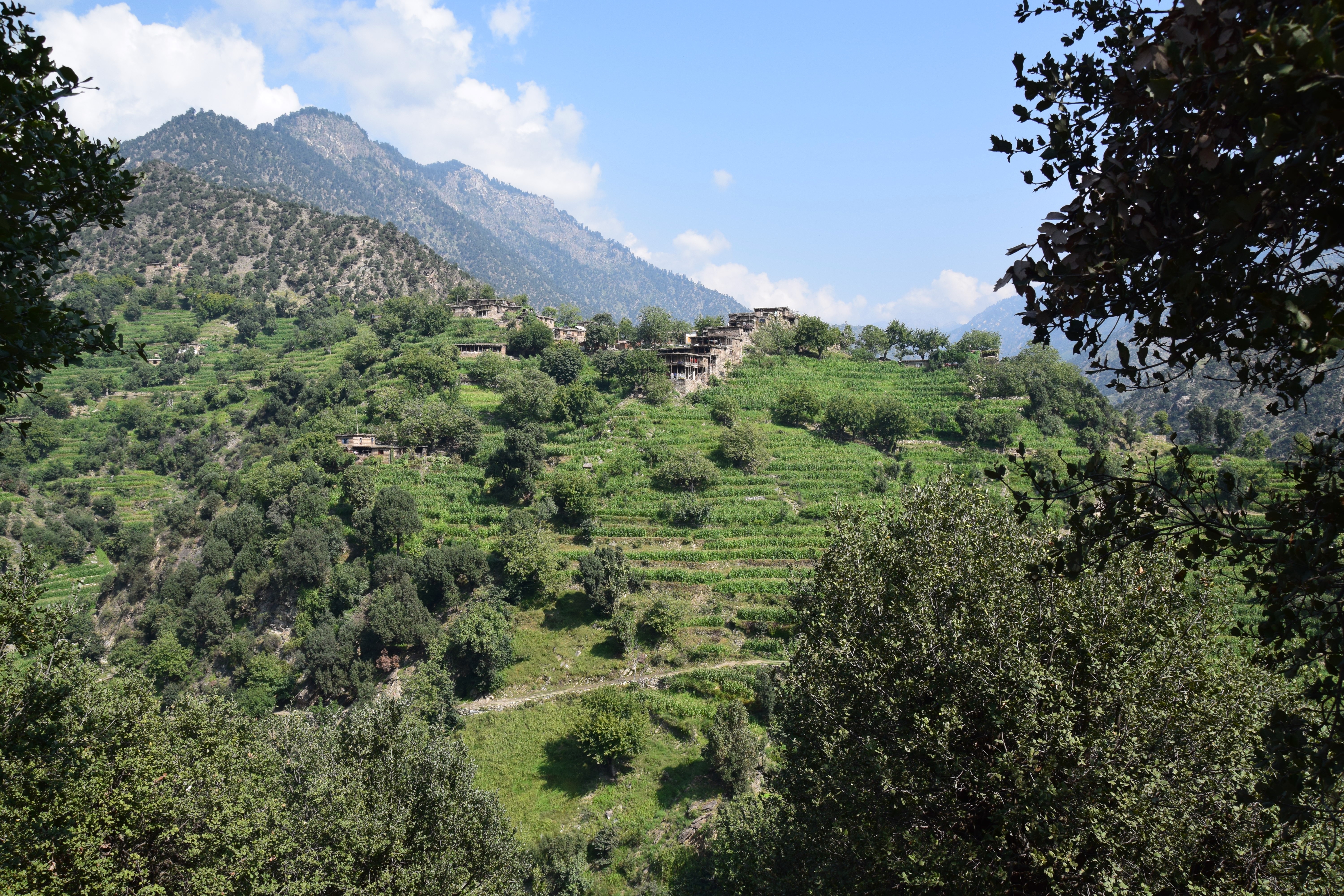
Daren, the main village of the valley with the same name in Ghaziabad District, Kunar Province, Afghanistan, September 7, 2022. Photo by Franz J. Marty.
Improvements Under the Taliban
While Afghans in such far-flung corners do their best to be as self-sufficient as possible, they are still dependent on bazaars to obtain certain goods, especially clothing, cooking oil, salt, sugar, and tea. “Before the revolution [Taliban takeover], we could not got to the bazaar in the main [Kunar] valley without running into problems,” said Saidullah, an old man who spent his whole life in Mumdesh, a hamlet tucked away in the vast forests at the very end of the Daren Valley. The reason for this is that people from Taliban areas were regularly suspected of being insurgents. “Now we can go without any issue,” he added gratefully. Others in the valley echoed the same.
At the same time, the disappearing of front lines between the government and insurgents also meant that public services reached remote villages in the Daren Valley — often for the first time. For example, on September 4, two inspectors from the education department arrived in Said Mashal, another hamlet at the end of the Daren Valley. “We are here to check that the school is actually working and that the teachers are present,” one of the two inspectors said. They had just arrived after an hours-long march on foot, as the only motorable road ends at near the middle of the valley.
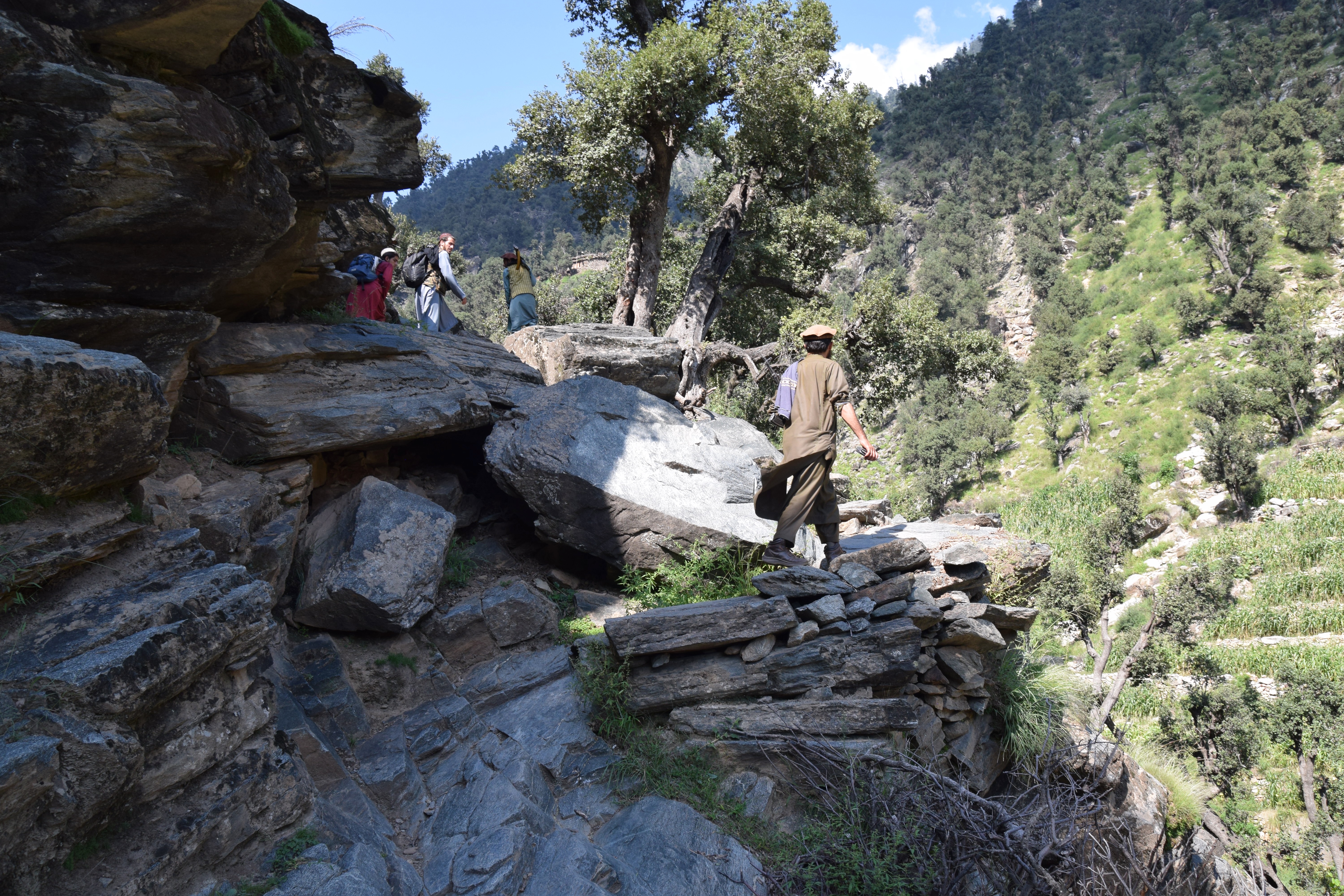
The end of Daren Valley is only reachable through an hours-long march on foot over a sometimes precarious path, September 2, 2022. Photo by Franz J. Marty.
With some delay, the only two teachers in Said Mashal then proceeded to show the inspectors the classes and how they teach the children. “We have more than two classes simultaneously; so we teach one class each, while one, two other classes have to continue without teachers with the tasks that we have given them,” Abdul Haq, the main teacher of the school in Said Mashal explained. And that is far from the only issue. There are no textbooks or notebooks and, with the school building remaining unfinished, most classes are taught in a mosque bare of any furniture. Whether the inspectors can solve such major issues is up for debate. But they visited and tried – a step that has never happened before in Said Mashal and as such is an improvement in itself.
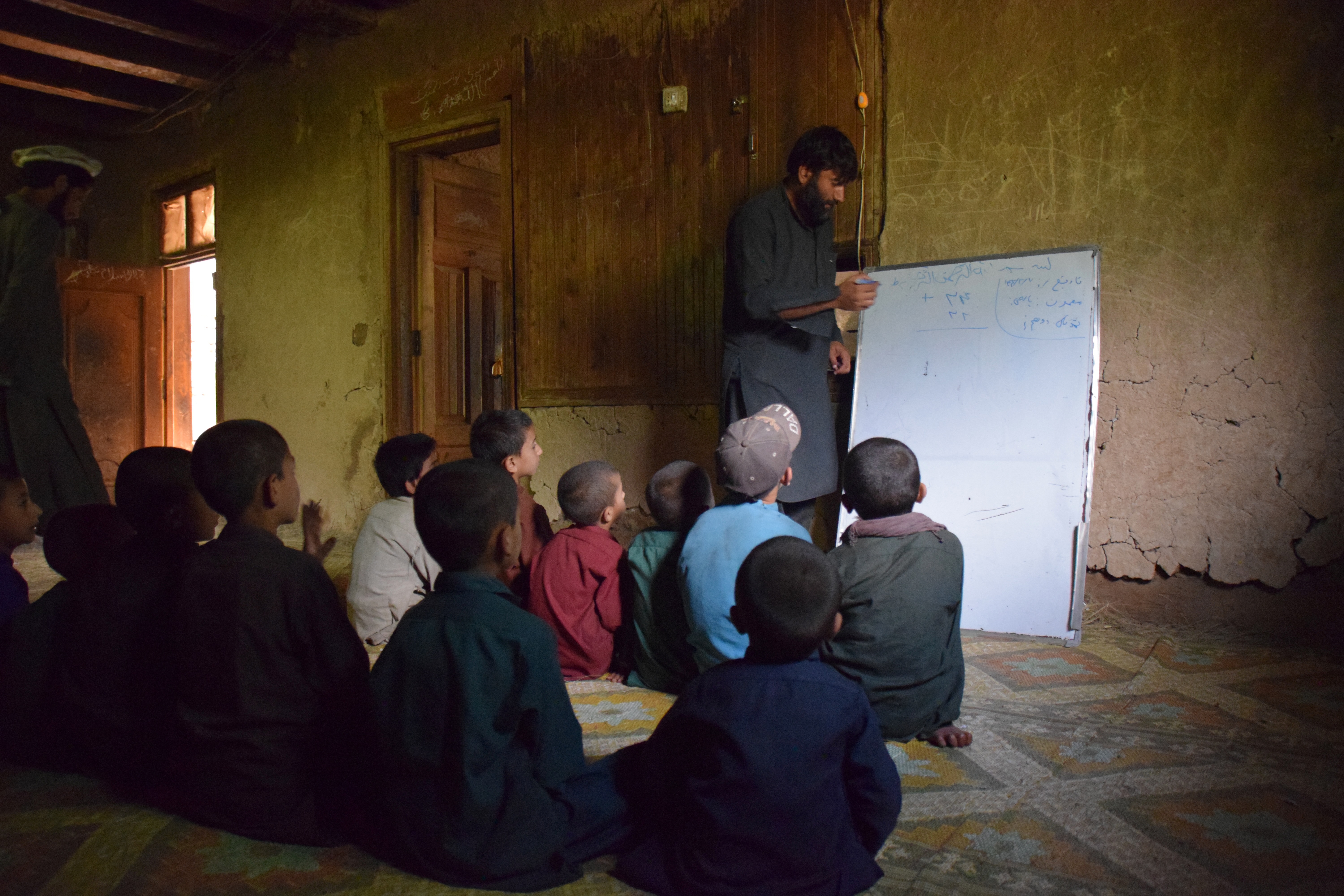
Boys in a class in Said Mashal, a village at the very end of Daren Valley. Due to the lack of class rooms, they are taught in a mosque bare of any furniture. September 4, 2022. Photo by Franz J. Marty.
And the school inspectors are not the only visitors to arrive for the first time at the end of the Daren Valley. On September 5 a group of vaccinators, after having visited every village in the valley, arrived in Mumdesh. “This is the first time that any vaccinator reached the end of the Daren Valley,” one vaccinator said and locals confirmed it.
While the work of the vaccinators is of great importance, unfortunately not all locals see it this way. “Some people are grateful, but others are against vaccines,” a vaccinator explains. “They have heard that vaccines are ‘haram’ [forbidden by Islam] or are an American conspiracy against Muslims,” he said, citing some reasons people had relayed.
“We remain non-confrontational and force no one to get their children vaccinated; that has allowed us to conduct our work without any major incidents,” he further explained. “This, however, also means that the children of about 40 percent of the people who refused vaccines are still at risk,” the vaccinator concluded.
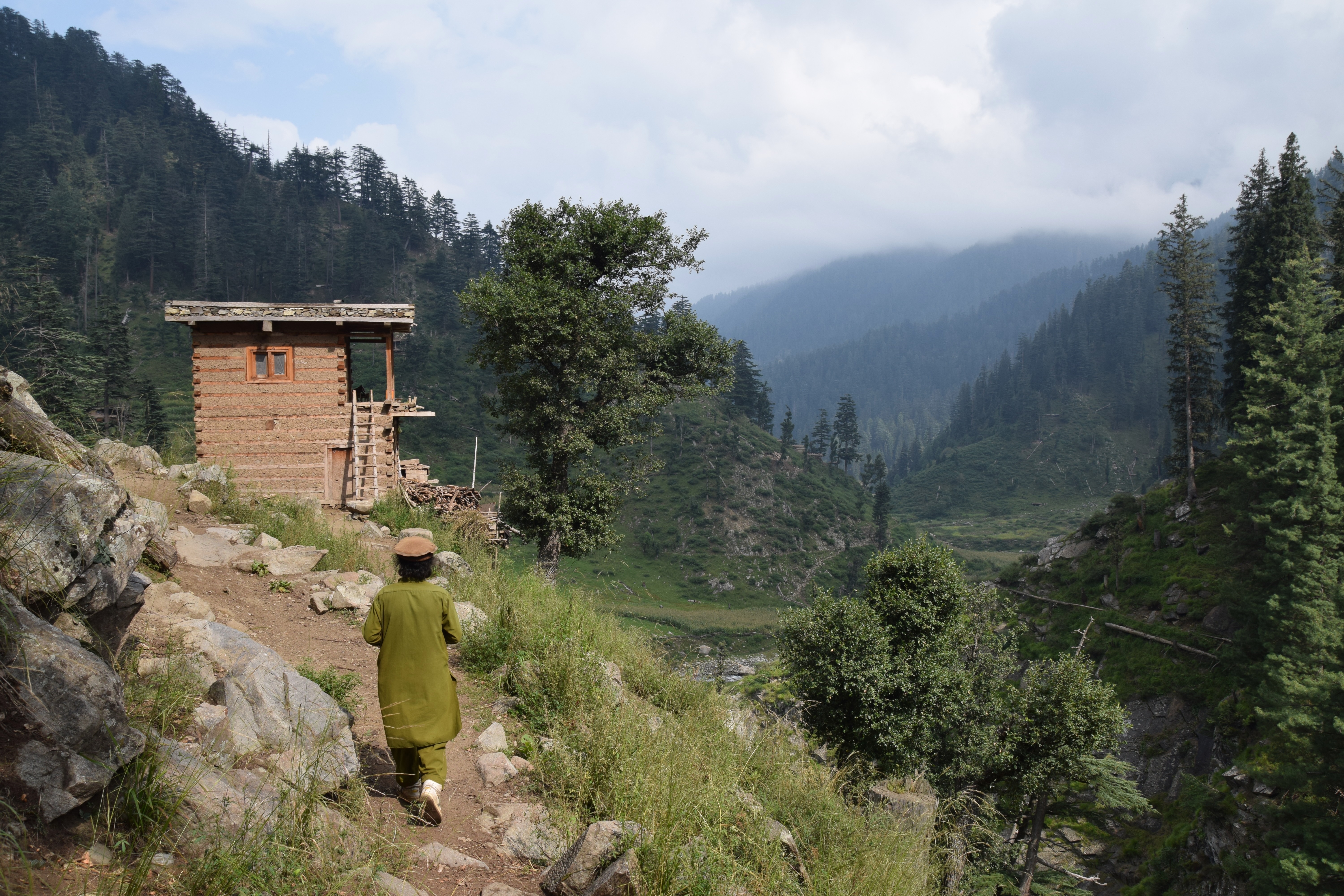
The last house in Mumdesh, a village at the very end of Daren Valley in Ghaziabad District, Kunar Province, Afghanistan, September 5, 2022. Photo by Franz J. Marty.
Remaining Dangers
These are not the only problems. While for some people in Daren, Taliban rule has meant more freedom of movement, this does not apply to everyone.
“We could not go to the bazaar [in the main valley] before [i.e. during the time of the Afghan Republic] and it is also not secure now,” one old man with a full grey beard complained in Said Mashal. “About six months ago [i.e. in early 2022, well into Taliban rule], my brother went, but was killed on the way back,” the man added.
Asked about the perpetrators, the man, who is, like all inhabitants of Said Mashal, an ethnic Nuristani, blamed “spies” among the Pashtuns living at the beginning of the Daren Valley. These “spies” used to work for the former Afghan Republic, he insisted. Another man interjected that these “spies” are not part of any organized anti-Taliban resistance group and even regularly pretend to be Taliban.
Both men several times ruled out that the targeting might be due to personal or ethnic disputes and asserted that they are in the cross-hairs because of their longstanding Taliban affiliation. This could not be confirmed, however, and various circumstances make it indeed possible, if not likely, that the reasons for the apparent risks for people of Said Mashal going through or past Pashtun areas might have more to do with local ethnic disputes than other factors.
While the people in Said Mashal blamed Pasthuns for continuing security risks, other Nuristanis in the Daren Valley indicated that ethnic Gujars who live in parts of the valley cause them problems. In general, Nuristanis claim that they are the original inhabitants of the Daren Valley and that the Gujars, an ethnic group said to have migrated from the Indian subcontinent, began to settle in the valley several decades ago. In the past, the Gujars had, on several occasions, burnt down Nuristani villages and forcibly taken their land, the Nuristanis assert.
What exactly happened is, however, hard to determine. Some other accounts indeed suggest that Gujars might have taken over land abandoned by Nuristanis and that reciprocal forcible replacements only began after Nuristanis wanted to reclaim areas where Gujars had arduously built a livelihood.
Be that as it may, currently, there are no forced evictions, with Gujars and Nuristanis staying in their respective villages, barely interacting with each other. However, disputes over timber still sometimes lead to clashes between the groups.
“At the end of the valley, the Gujars have chopped timber and wanted to transport it on the river down to the main valley to sell it; but we intercepted it,” a local Nuristani in Daren, the village giving the valley its name, stated in early September 2022. “The Gujars tried to take it back. They took positions on the mountains around our village and started to shoot at us. We fought back and fended them off. This all happened only days ago,” he elaborated. Other men confirmed this — and that, on both sides, Taliban members were involved in the fighting.
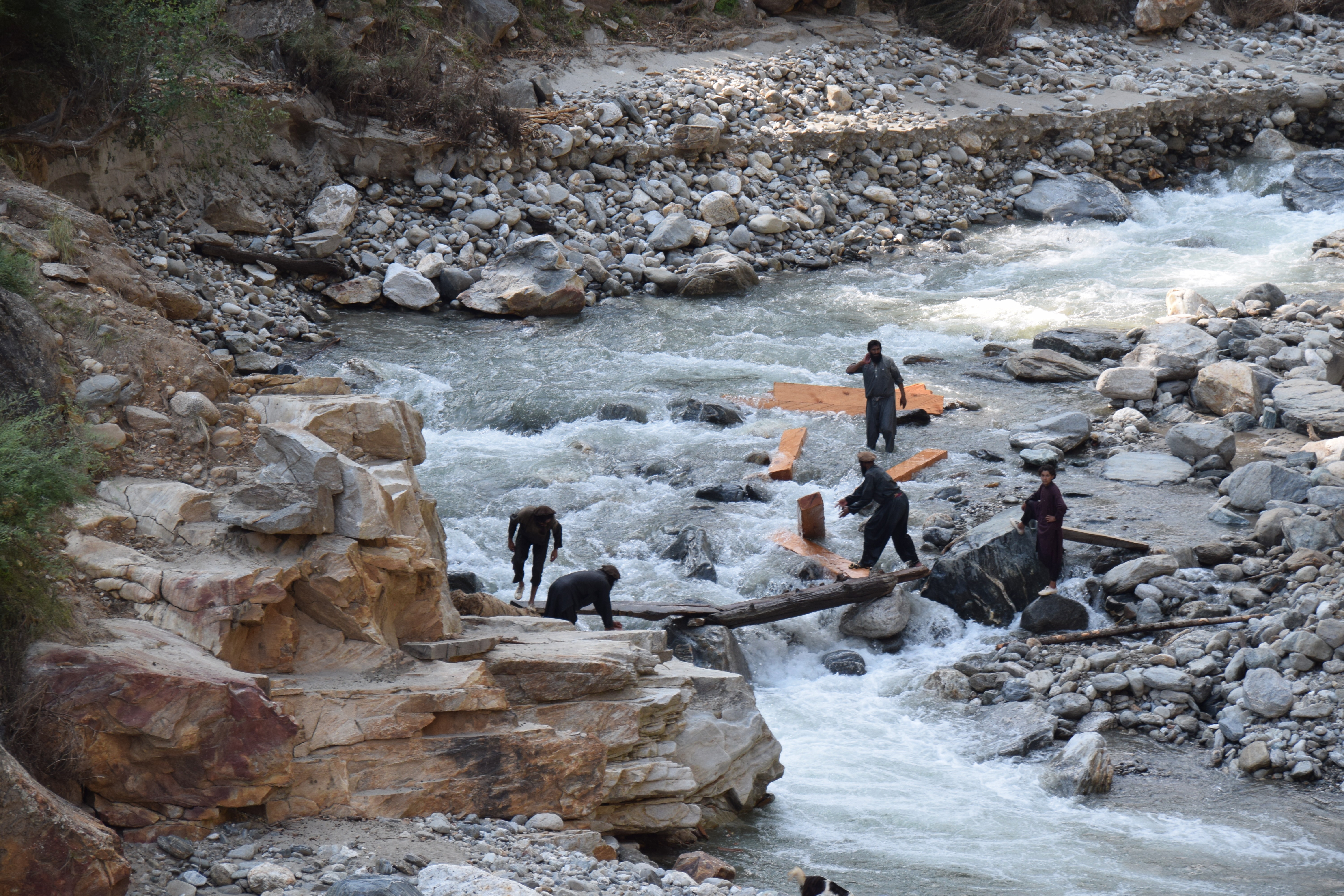
Local men transporting cut wooden beams via the river in the Daren Valley in Ghaziabad District, Kunar Province, Afghanistan, September 3, 2022. Photo by Franz J. Marty.
Who is right is hard to say. The Nuristanis base their claim of exclusive privilege to the vast forests in the upper valley on a decree from an Afghan emir issued over 100 years ago; the Gujars, on the other hand, apparently see the seemingly endless woods as common good for all people and deem it theft if the Nuristanis take timber beams that Gujars had cut and transported with great effort.
Economic Woes
Another consistent worry for people in the Daren Valley is how to make a living. Several men claimed to have fought with the Taliban during their time as an insurgency and said that they now would like to get an official, paid position with the Taliban security forces. As of early September 2022, however, they had not had any opportunity to be recruited.
“I was a Talib right until the Taliban victory. Then, I went home to live off my land; but a recent flood has destroyed most of my fields irreversibly and I now try to get a position in the Taliban army, but so far without success,” one man in Shaigal, the village where the only drivable road in the Daren Valley ends, lamented.
Another man in Said Mashal claimed to have been a Talib during the insurgency and to have afterwards enlisted in the Taliban police force. “I was on the official list and served four months,” he asserted. “Then I was sent home and, when I later wanted to return, was told that I am not on the official roster anymore,” he added.
For the four months he had served in the Taliban police, he claimed to have been paid less than 20 percent of his salary. “The rest was taken by the commander,” he claimed. While the latter could not be independently verified, it is interesting to note that the claim that commanders siphon off salaries of the rank-and-file was repeatedly reported by the security forces of the toppled Afghan Republic too.
That there are general problems with enrollment and salaries in Taliban security forces in Kunar was confirmed by other Taliban. “The [Taliban] police of the district of Ghaziabad initially comprised 450 men; then, they only officially enlisted 250 and sent the other 200 home,” one Talib said, adding that “even the ones who are officially enlisted have problems with their salaries.” This was confirmed by another Talib, who stated that he has been officially serving in the police force for Ghaziabad for a year, but not been paid during this time. Such complaints also echo issues during the Afghan Republic.
One possible explanation is a lack of organization paired with misunderstandings on the side of Taliban rank-and-file about who is hired and who not. That said, Taliban serving in the security forces in Ghaziabad stated that the Taliban government has announced that all members of security forces will be biometrically registered. Whether this will curb the aforementioned issues remains to be seen.
Living off the Land and Humanitarian Aid
Given that the Taliban in Ghaziabad are unable to provide even all of their own fighters with a job and livelihood, regular people have it even more difficult. Almost always, their only option is to live off their land. And as land is, particularly in the lower lying main villages, a more than rare commodity, numerous people have started to move to very remote areas in the vast forest at the end of the Daren Valley. There, they plan to cultivate land that has, due to the harsh conditions in such places, been lying fallow, sometimes for decades.
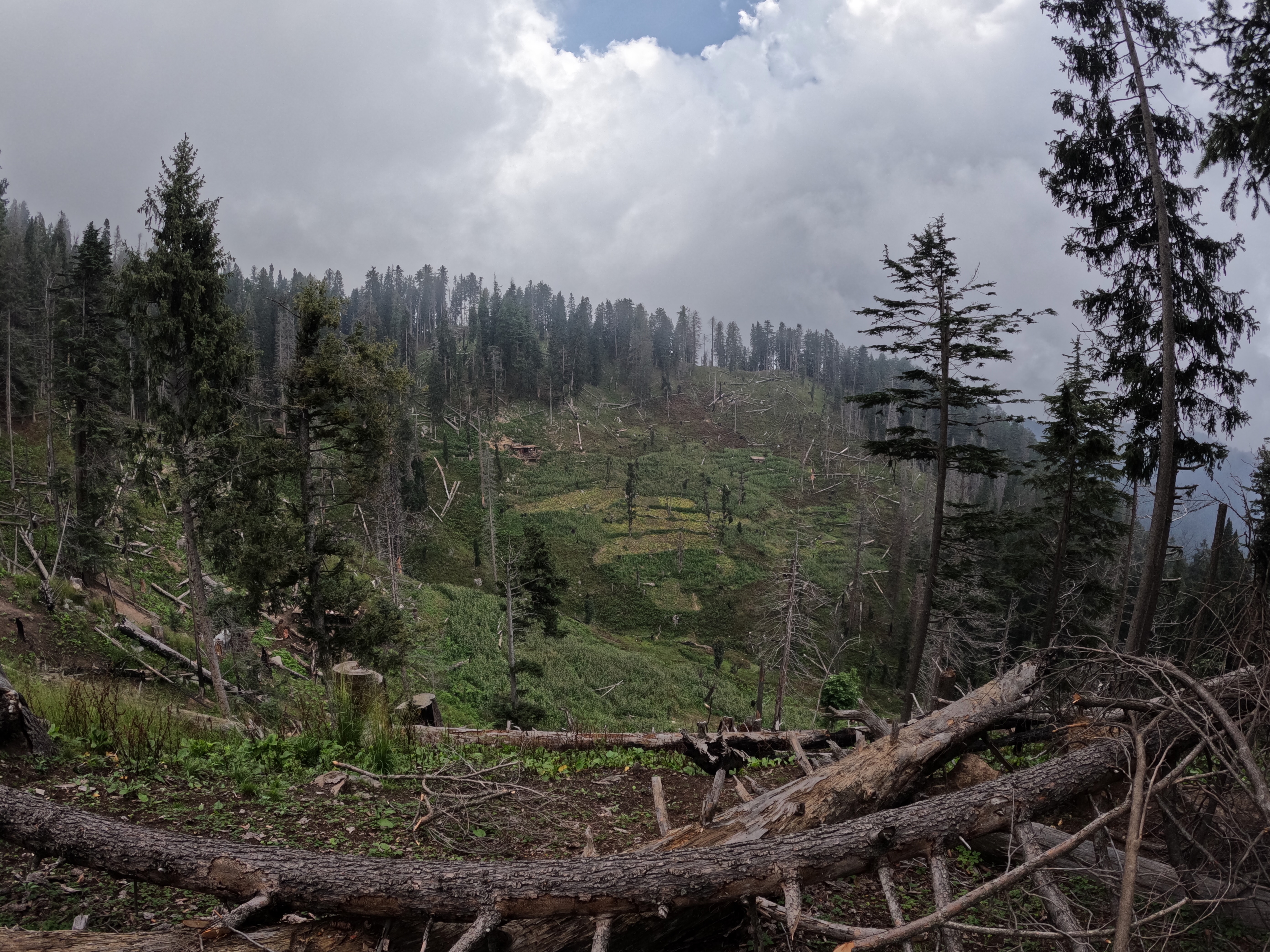
Sarkatoo, a village in the woods at the end of Ghaziabad District, Kunar Province, Afghanistan, where people are resettling to live off land that has been lying fallow for years due to the harsh conditions in such remote places, September 6, 2022. Photo by Franz J. Marty.
Apart from that, at least in the main village of Daren and surrounding areas some humanitarian aid has arrived. “Since the Taliban victory [in August 2021], we got food aid on around six occasions. The aid was provided by WFP [World Food Program] and we could pick it up in the district center [of Ghaziabad],” a local leader of Daren said in early September 2022. “Unfortunately, the aid is insufficient. Each time we only got about 30 to 45 packages, where each package consists of a bag of flour, some cooking oil, and other items like lentils. And this is supposed to be for Daren and 15 surrounding villages, which is by far not enough,” he claimed.
However, in a subsequent discussion it became clear that the villagers in Daren do not exactly know who is entitled to how much food aid and it is very possible that there is a misunderstanding, namely that the delivered aid is meant for a selected small group and not 15 villages.
Despite all these hardships, some locals can’t imagine leaving their home valley. “I would never move from here, not even if someone would give me a house in [the Afghan capital] Kabul or abroad,” Faqir Mohammad, an old man with a gaunt face and bushy white eyebrows matching his beard, said without hesitation.
Others would leave but lack the opportunity. “Except for my house here, I have nothing; so I can’t go anywhere. If I could get a job elsewhere, I would leave,” a young relative of Faqir Mohammad said.













